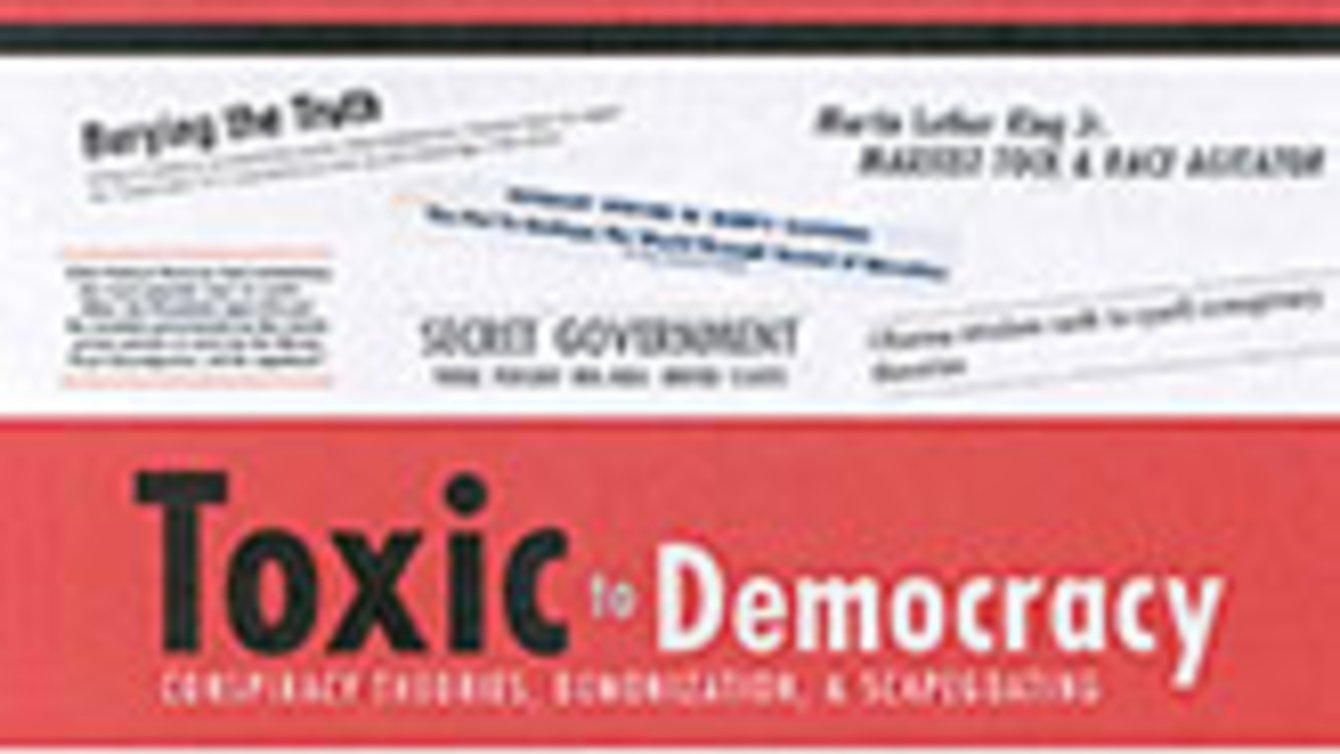Toxic to Democracy

In his 2009 report, Toxic to Democracy: Conspiracy Theories, A way of portraying a person or group as malevolent, sinful, or evil; often a precursor to scapegoating and conspiracism. Learn more , & Blaming a person or group wrongfully for some problem, especially for other people’s misdeeds. Scapegoating deflects people’s anger and grievances away from the real causes of a social problem onto a target group demonized as malevolent wrongdoers. Learn more , former PRA Senior Analyst Chip Berlet traces the roots of A mode of political explanation that assumes a vast insidious plot against the common good. Learn more throughout U.S. and European history and challenges it as a form of political analysis.
Modern conspiracism is rooted in An attitude toward social identities that can be mobilized to justify discrimination, state/vigilante violence, and exploitation. Learn more , especially A form of oppression targeting Jews and those perceived to be Jewish, including bigoted speech, violent acts, and discriminatory policy. Learn more and An ideology that assumes a hierarchy of human worth based on the social construction of racial difference. Racism as an ideology claims superiority of the socially constructed category, White, over other racialized categories based on the false idea that race is a fixed and immutable reality. Learn more . Conspiracy theories encourage demonization and scapegoating of blameless persons and groups—distracting society and would-be agents of change away from the real causes of social and economic injustice. It’s practiced by demagogues on the Right and on the Left—and both inside and outside the corridors of power.
Demagogues and conspiracy theorists use the same four “tools of fear,” which Berlet identifies as 1) A form of binary thinking that divides people, ideas, & policies into good & evil, leaving no room for compromise or nuance. Learn more ; 2) scapegoating; 3) demonization; and 4) apocalyptic aggression. The basic dynamics remain the same no matter the ideological leanings of the demonizers or the identity of their targets. Meanwhile, our ability to resolve disputes through civic debate and compromise is hobbled. The study focuses on the history and dynamics of conspiracism, but argues that it is the combination of demagogic demonization and widespread conspiracy scapegoating that is so dangerous. In such circumstances, “angry allegations can quickly turn into aggression and violence targeting scapegoated groups,” writes Berlet.
Berlet warned that the combination of burgeoning conspiracy theories coupled with rising populist rage and anti-Obama scapegoating would likely lead to some individuals acting out in apocalyptic violence. They would feel justified because they were acting “before it was too late” to save the nation from an imagined sinister plot.
What about the right-wing media foghorns? Convicted in the fatal shooting of abortion provider Dr. George Tiller in a church in Wichita, Kansas, Scott Philip Roeder was a regular consumer of conservative talk radio, television, and websites. But did Bill O’Reilly, Rush Limbaugh, Sean Hannity, Glenn Beck—or any other commentator whipping up an audience with overheated demonizing rhetoric—actually help pull the trigger? It’s not that simple, explains Berlet, “They are not legally culpable for the assassination of Dr. Tiller, says Berlet, “but they must share some portion of moral responsibility for creating a dangerous environment.”
According to Berlet:
“Right-wing pundits demonize scapegoated groups and individuals in our society, implying that it is urgent to stop them from wrecking the nation. Some angry people in the audience already believe conspiracy theories in which the same scapegoats are portrayed as subversive, destructive, or evil. Add in aggressive apocalyptic ideas that suggest time is running out and quick action mandatory and you have a perfect storm of mobilized resentment threatening to rain bigotry and violence across the United States.”
MEDIA:
- Chip Berlet and Frederick Clarkson speak about the the assassination of Dr. Tiller on Democracy Now.
- Hear Chip Berlet on NPR’s Fresh Air program in a half-hour interview with host Terry Gross.